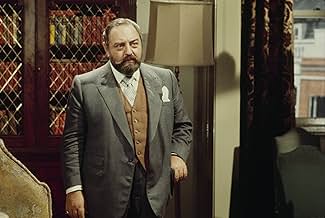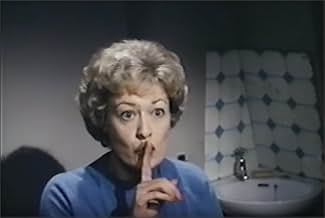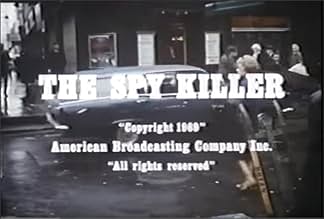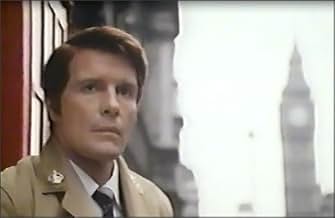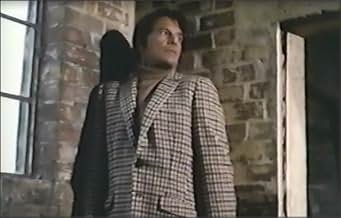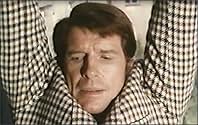PUNTUACIÓN EN IMDb
6,1/10
101
TU PUNTUACIÓN
Añade un argumento en tu idiomaA one-time secret agent is blackmailed by his former boss back into the world of espionage which he had intended to leave permanently.A one-time secret agent is blackmailed by his former boss back into the world of espionage which he had intended to leave permanently.A one-time secret agent is blackmailed by his former boss back into the world of espionage which he had intended to leave permanently.
Argumento
¿Sabías que...?
- ConexionesFollowed by Intercambio (1970)
- Banda sonoraBorn Beneath A Star
Music by Johnny Pearson
Lyrics by Tony Colton
Sung by John Rowles
Reseña destacada
Due, in part, to President Kennedy's affinity to the Ian Fleming novels, and the seemingly endless "Cold War," the 60's saw the founding of the spy movie genre as we now know it. After the Bond movies made box office gold, there were soon other franchises such as the "Flint" movies and the "Matt Helm" and "Harry Palmer" franchises. While the Harry Palmer films were serious spy stories, most of the competing franchises were more spoofs of the Bond series than serious spy films. The Bond films eventually devolved into less serious spy films as well, until the Daniel Craig era brought things back to a more serious tone.
When the spy movie era arrived, television jumped on the bandwagon right away. There were series such as "The Man From Uncle" and "I Spy" which sought to cash in on the spy genre. However, other than these regular series, there was only one "made for TV" spy movie franchise and that was the John Smith series. This series has simply not been given the attention deserved as these are very good stories in the John le Carre' or "Harry Palmer" tradition. They were made in Pinewood Studios in Britain (where many of the early Bond films were made) and enjoyed a British flair to their production. These movies stand out as excellent spy movies (with a strong film noir feel to them) albeit made for the ABC movie of the week time slot which limited them to 75 minutes each. This is the only draw back in these films—the editing to fit the time slot sometimes moved the story too quickly.
Robert Horton was cast as the lead character. This was quite a departure for him since he had been primarily an actor in westerns prior to filming "The Spy Killer" and its follow-up film "Foreign Exchange." After his departure from "Wagon Train" there was briefly talk of him starring in a private eye series but this never came to pass. He generally continued to play characters from the old west until this series. Horton was a good actor and a good choice for this franchise as he had good screen presence and was convincing in the role. John Smith is a former operative of the C.I.A. and, later, British Intelligence and has been an assassin for his English boss "Max"--- played exquisitely by Sebastian Cabot. Smith has retired from the spy business because he was forced to kill someone who "didn't have it coming." Jill St. John plays his girlfriend during her long hair period when, in this writer's humble opinion, she was her most beautiful. Her acting in this is actually pretty good for sometimes she has been called upon to be eye candy rather than a serious actor.
The novels that these films were based upon were written by Jimmy Sangster (Britain's answer to America's Richard Matheson, with more of a bent for film noir) who wrote only two novels in the John Smith series, viz "Private, I" (which became "The Spy Killer") and "Foreign Exchange." The stories are serious spy stories, without the flashy cars or gadgets or constant gun play. Indeed, Smith's pistol is kept in a safe deposit box and it is a Colt 1911 A-1 Army model—the kind of gun to which a former military man might have an affinity. Sangster keeps everyone guessing as to who will double cross whom next. The beauty of these films is that, as in the real world of espionage, nothing is to be trusted or taken at face value. The plot and dialogue of both films are extremely good (which tends to be the case with British productions—face it, the Brits are more artful with the language than most Americans).
These films would be the last starring roles for Robert Horton in a movie, for he would soon take his career to the stage and Broadway and only occasionally appear thereafter on TV or in film. It is a pity that three or four additional installments to the series did not come to pass for it was a great character. But, like the Flint saga, it ended after only two movies. This writer hopes and predicts that, now that Robert Horton has passed away, these films will be rediscovered. Good luck finding copies of these films. "The Spy Killer" is available on Amazon in a DVD with four other old movies, but "Foreign Exchange" is currently only available in bootleg copies.
When the spy movie era arrived, television jumped on the bandwagon right away. There were series such as "The Man From Uncle" and "I Spy" which sought to cash in on the spy genre. However, other than these regular series, there was only one "made for TV" spy movie franchise and that was the John Smith series. This series has simply not been given the attention deserved as these are very good stories in the John le Carre' or "Harry Palmer" tradition. They were made in Pinewood Studios in Britain (where many of the early Bond films were made) and enjoyed a British flair to their production. These movies stand out as excellent spy movies (with a strong film noir feel to them) albeit made for the ABC movie of the week time slot which limited them to 75 minutes each. This is the only draw back in these films—the editing to fit the time slot sometimes moved the story too quickly.
Robert Horton was cast as the lead character. This was quite a departure for him since he had been primarily an actor in westerns prior to filming "The Spy Killer" and its follow-up film "Foreign Exchange." After his departure from "Wagon Train" there was briefly talk of him starring in a private eye series but this never came to pass. He generally continued to play characters from the old west until this series. Horton was a good actor and a good choice for this franchise as he had good screen presence and was convincing in the role. John Smith is a former operative of the C.I.A. and, later, British Intelligence and has been an assassin for his English boss "Max"--- played exquisitely by Sebastian Cabot. Smith has retired from the spy business because he was forced to kill someone who "didn't have it coming." Jill St. John plays his girlfriend during her long hair period when, in this writer's humble opinion, she was her most beautiful. Her acting in this is actually pretty good for sometimes she has been called upon to be eye candy rather than a serious actor.
The novels that these films were based upon were written by Jimmy Sangster (Britain's answer to America's Richard Matheson, with more of a bent for film noir) who wrote only two novels in the John Smith series, viz "Private, I" (which became "The Spy Killer") and "Foreign Exchange." The stories are serious spy stories, without the flashy cars or gadgets or constant gun play. Indeed, Smith's pistol is kept in a safe deposit box and it is a Colt 1911 A-1 Army model—the kind of gun to which a former military man might have an affinity. Sangster keeps everyone guessing as to who will double cross whom next. The beauty of these films is that, as in the real world of espionage, nothing is to be trusted or taken at face value. The plot and dialogue of both films are extremely good (which tends to be the case with British productions—face it, the Brits are more artful with the language than most Americans).
These films would be the last starring roles for Robert Horton in a movie, for he would soon take his career to the stage and Broadway and only occasionally appear thereafter on TV or in film. It is a pity that three or four additional installments to the series did not come to pass for it was a great character. But, like the Flint saga, it ended after only two movies. This writer hopes and predicts that, now that Robert Horton has passed away, these films will be rediscovered. Good luck finding copies of these films. "The Spy Killer" is available on Amazon in a DVD with four other old movies, but "Foreign Exchange" is currently only available in bootleg copies.
- jawlaw
- 9 ene 2017
- Enlace permanente
Selecciones populares
Inicia sesión para calificar y añadir a tu lista para recibir recomendaciones personalizadas
Detalles
- Fecha de lanzamiento
- País de origen
- Idioma
- Títulos en diferentes países
- Geheimagent John Smith: Zur Spionage erpreßt
- Localizaciones del rodaje
- Empresas productoras
- Ver más compañías en los créditos en IMDbPro
Contribuir a esta página
Sugerir un cambio o añadir el contenido que falta

Principal laguna de datos
By what name was El espía asesino (1969) officially released in Canada in English?
Responde
